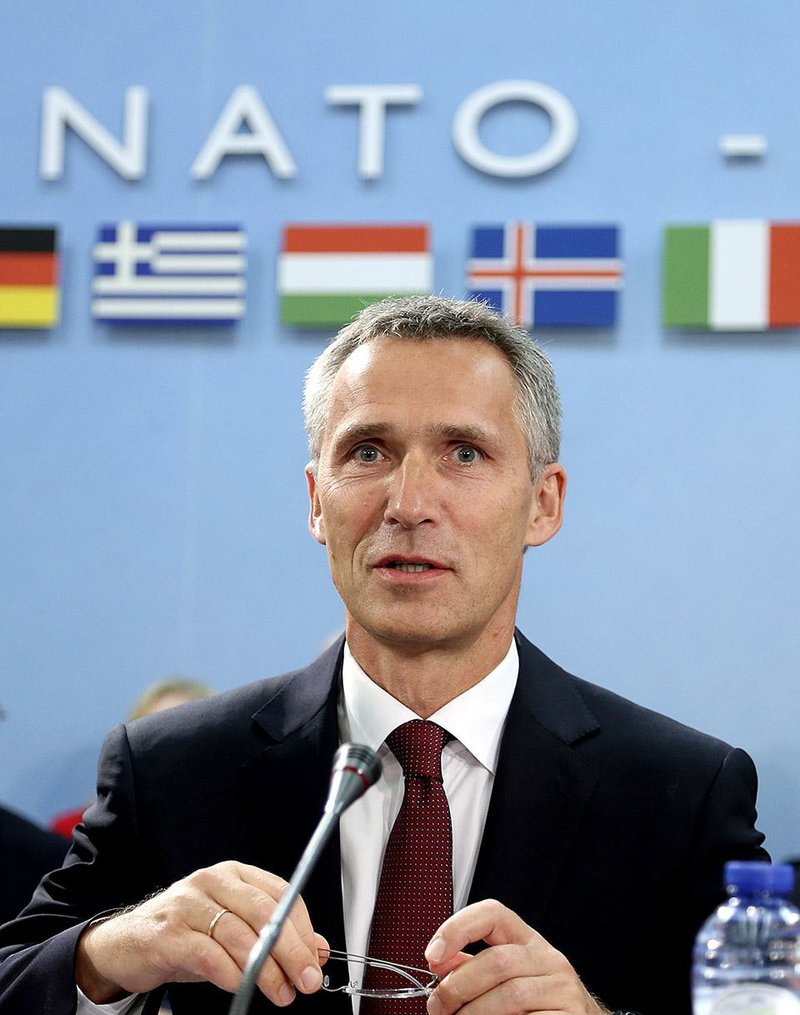BRUSSELS -- NATO's new secretary-general struck a conciliatory tone Wednesday on Russia, saying there's a chance now for improved relations between Moscow and the West.
"We see opportunity in the cease-fire, which has now been established in the eastern part of Ukraine, but we also see violations of the cease-fire and that it's a fragile situation," Jens Stoltenberg said.
On his first day in office, Stoltenberg, 55, also welcomed the bombing campaign being waged by the United States, France, Britain and other NATO and non-NATO nations against Islamic State militants, who he said have committed "horrific atrocities" in Iraq and Syria.
He said he finds "no contradiction" between his desire for a strong NATO and the quest for better ties with Russia. But he also demanded that Moscow adhere to international law and that there be a "clear change" in Russian actions toward Ukraine.
On Wednesday, pro-Russian rebels in eastern Ukraine advanced on the government-held airport in Donetsk, pressing to seize the key transportation hub as the two sides bargained over a troop pullout under the much-violated truce.
Fighting for the airport has raged for months as the insurgents have tried to dislodge the government forces using it to shell rebel positions in Donetsk, the largest rebel-held city. At least nine people were killed in the crossfire Wednesday in residential areas near the airport.
Civilian and military casualties have continued to rise in eastern Ukraine despite a cease-fire Sept. 5 and a second agreement Sept. 20 that spelled out how to create a buffer zone. While that helped to enforce the cease-fire in areas where Ukrainians troops and rebels chose to retreat, nonstop fighting has continued at the airport and other strategic locations.
Stoltenberg also said Wednesday that NATO would react with an "open mind" if Russia were to seek to revive the NATO-Russia Council, which has virtually ceased to operate since Russia annexed Ukraine's Crimean peninsula in March.
A former two-term Norwegian prime minister, Stoltenberg became the 13th secretary-general in the trans-Atlantic organization's 65-year existence.
Stoltenberg was unanimously chosen as Anders Fogh Rasmussen's successor by NATO's policymaking North Atlantic Council in March. The choice won swift if tentative approval from Russian President Vladimir Putin, who had dealt with Stoltenberg when he headed a center-left government in Norway, a Russian neighbor.
"We have very good relations, including personal relations," Putin said at the time. "This is a very serious, responsible person, but we'll see how our relations develop with him in his new position."
Traditionally, a European has headed NATO's civilian headquarters in Brussels, while an American officer holds the post of the alliance's supreme military commander, beginning with Gen. Dwight D. Eisenhower in 1951-52.
Stoltenberg is the first secretary-general to hail from an alliance nation that borders Russia. He becomes NATO's highest-ranking civilian at a time when Western relations with Moscow are at their lowest ebb since the Cold War.
Stoltenberg said during a news conference at NATO headquarters that his three priorities are to "keep NATO strong. Help keep our neighborhood stable by working with partners. And keep the bond between Europe and North America rock solid."
NATO will not let its guard down on its eastern fringe, he promised, adding that the beefed-up air and sea patrols and land exercises intended to reassure nations like Poland that are worried about Moscow's intentions will continue as long as necessary.
"We will uphold our commitment and we will defend our allies," Stoltenberg said.
In February, he said, NATO defense ministers should agree on the size and makeup of a new highly mobile "spearhead force" that could rapidly reinforce allies menaced by Russia or other threats.
An economist by training, Stoltenberg became Norway's youngest prime minister in 2000 at 41, though he had to resign seven months later when his Labor Party took a beating at the polls.
In the waning days of the Cold War, when he was a promising young politician, the Soviet Union's spy agency tried to recruit him, but he reported the KGB's attempts to Norwegian authorities, Norwegian intelligence officials have said.
Stoltenberg has long been a staunch U.S. ally. He endorsed President George W. Bush's "war on terror" after the Sept. 11, 2001, terrorist attacks, backed the decision to send Norwegian troops to Afghanistan and sent Norwegian units to take part in NATO airstrikes in Libya.
Information for this article was contributed by Jan M. Olsen, Lynn Berry, Geir Moulson, Karl Ritter, Darko Vojinovic, Laura Mills, Jim Heintz and Vladimir Isachenkov of The Associated Press.
A Section on 10/02/2014

